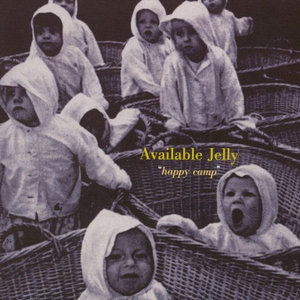"happy camp" by Available Jelly
Tracklist
| 1. | Nilentika - Tazana Kely - trad. Madagascar | 6:02 |
| 2. | The Feeling of Jazz | 5:42 |
| 3. | Boppard | 5:25 |
| 4. | Unihabited Island | 4:12 |
| 5. | Elmo | 4:46 |
| 6. | Putto | 4:15 |
| 7. | Big Piece | 16:55 |
| 8. | Cowboy Henk | 6:08 |
| 9. | The Village of the Virgins | 5:15 |
| 10. | Happy Camp | 4:47 |
Credits
released September 9, 1996
Available Jelly, Happy Camp
Ramboy 10, 1996
Available Jelly began in 1976 in Salt Lake City, Utah, USA, as the sonic counterpoint to "The Great Salt Lake Mime Troupe", a dance/theater group. In the ensuing score of years the theatricality and eclecticism of the original repertoire have been augmented with "vehicles for improvisation". Working with the limitations of a "chordless" horn and drum band has led us to a special kind of group improvisation, certainly not without precedent in the history of jazz, but often neglected. Why can't more people live in counterpoint?
Origins and the business of music
"Nilentika" & "Tazana Kely" are two tunes from Madagascar. I first heard these played together by the accordionist David Andriamamonjy on Globe Style Records's Madagaskara One/Current Traditional Music. On the record it is credited as traditional, arranged by Andriamamonjy. In the liner notes producer Ben Mandelson states that these two tunes are "two waltzes by a lady who lives in Tamatave". Since then I've heard a tape by the group Rossy which includes "Tazana Kely" credited to Bao Angèle - Rossy. Is Bao Angèle the woman from Tamatave who writes waltzes in 3/4 and 4/4 time?
"The Feeling of Jazz" is a tune written by Duke Ellington with words by Bobby Troup. Also credited is writer George Simon who had written a book with the same name and, according to Troup, suggested that Bobby write a lyric. It appears on the Impulse album Duke Ellington and John Coltrane, on Troup's own CD The Feeling of Jazz (Star Line Productions) - nice vocal, and an Ellington Black-Lion CD of the same name. It's a catchy title.
"Boppard" is the name of a town on the banks of the Rhine in the neighborhood of Bingen and Bacharach.
"Uninhabited Island" is a reflection on the meditative musical patterns accompanying spoken or sung stories in West Africa.
"Big Piece" is not so much big as long. My inspiration was the recording of Tim Berne's Bloodcount, Low Life (JMT). Tim writes really long pieces.
"Cowboy Henk" is an ode to the Kamagurka comic hero with the same name. It is also an ode to Wolter who, in our vision, represents Cowboy Henk.
"The Village Of The Virgins" is a section of the suite The River commissioned in 1970 by The American Ballet Theater. It is basically a blues with a bridge but Ellington uses unconventional chordal movement in the blues sections: going the "wrong way" around the circle of fifths, then back again. The original recording is on volume five of Duke Ellington - The Private Collection (SAJA).
"Happy Camp" is a town way, way up the Klamath River in northern California.
Notes by Michael Moore.
Michael Moore, alto saxophone, clarinet, bass clarinet
Tobias Delius, tenor saxophone
Eric Boeren, cornet, melodica
Wolter Wierbos, trombone
Ernst Glerum, bass
Michael Vatcher, drums, percussion
Composed by Michael Moore except where noted.
Recorded live June 22, 1996,
BIM-huis, Amsterdam
Photo, Edward Weglowski
Design, Isabelle Vigier
Recorded by Dick Lucas/ data records
this is Ramboy #10
distributed by B.V. Haast
Prinseneiland 99
1013 LN Amsterdam, NL
www.ramboyrecordings.com
www.doek.org
Available Jelly, Happy Camp
Ramboy 10, 1996
Available Jelly began in 1976 in Salt Lake City, Utah, USA, as the sonic counterpoint to "The Great Salt Lake Mime Troupe", a dance/theater group. In the ensuing score of years the theatricality and eclecticism of the original repertoire have been augmented with "vehicles for improvisation". Working with the limitations of a "chordless" horn and drum band has led us to a special kind of group improvisation, certainly not without precedent in the history of jazz, but often neglected. Why can't more people live in counterpoint?
Origins and the business of music
"Nilentika" & "Tazana Kely" are two tunes from Madagascar. I first heard these played together by the accordionist David Andriamamonjy on Globe Style Records's Madagaskara One/Current Traditional Music. On the record it is credited as traditional, arranged by Andriamamonjy. In the liner notes producer Ben Mandelson states that these two tunes are "two waltzes by a lady who lives in Tamatave". Since then I've heard a tape by the group Rossy which includes "Tazana Kely" credited to Bao Angèle - Rossy. Is Bao Angèle the woman from Tamatave who writes waltzes in 3/4 and 4/4 time?
"The Feeling of Jazz" is a tune written by Duke Ellington with words by Bobby Troup. Also credited is writer George Simon who had written a book with the same name and, according to Troup, suggested that Bobby write a lyric. It appears on the Impulse album Duke Ellington and John Coltrane, on Troup's own CD The Feeling of Jazz (Star Line Productions) - nice vocal, and an Ellington Black-Lion CD of the same name. It's a catchy title.
"Boppard" is the name of a town on the banks of the Rhine in the neighborhood of Bingen and Bacharach.
"Uninhabited Island" is a reflection on the meditative musical patterns accompanying spoken or sung stories in West Africa.
"Big Piece" is not so much big as long. My inspiration was the recording of Tim Berne's Bloodcount, Low Life (JMT). Tim writes really long pieces.
"Cowboy Henk" is an ode to the Kamagurka comic hero with the same name. It is also an ode to Wolter who, in our vision, represents Cowboy Henk.
"The Village Of The Virgins" is a section of the suite The River commissioned in 1970 by The American Ballet Theater. It is basically a blues with a bridge but Ellington uses unconventional chordal movement in the blues sections: going the "wrong way" around the circle of fifths, then back again. The original recording is on volume five of Duke Ellington - The Private Collection (SAJA).
"Happy Camp" is a town way, way up the Klamath River in northern California.
Notes by Michael Moore.
Michael Moore, alto saxophone, clarinet, bass clarinet
Tobias Delius, tenor saxophone
Eric Boeren, cornet, melodica
Wolter Wierbos, trombone
Ernst Glerum, bass
Michael Vatcher, drums, percussion
Composed by Michael Moore except where noted.
Recorded live June 22, 1996,
BIM-huis, Amsterdam
Photo, Edward Weglowski
Design, Isabelle Vigier
Recorded by Dick Lucas/ data records
this is Ramboy #10
distributed by B.V. Haast
Prinseneiland 99
1013 LN Amsterdam, NL
www.ramboyrecordings.com
www.doek.org
License
All rights reserved.Recommendations
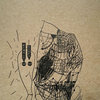 Anguis Oleum
Anguis Oleumby Snakeoil
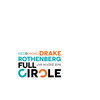 Full Circle - Live in Łódź
Full Circle - Live in Łódźby Ned Rothenberg & Hamid Drake
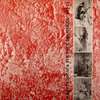 John Tchicai & Strange Brothers
John Tchicai & Strange Brothersby JOHN TCHICAI
 COLYALCOLOR
COLYALCOLORby Francisco Morato, John Dikeman, Julien Tassin, Hugo Costa, Aleksandar Škorić
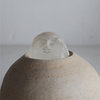 I was too young to hear silence
I was too young to hear silenceby Patrick Shiroishi
 Hermetic Topography
Hermetic Topographyby Zebularin
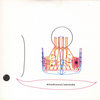 Seconds
Secondsby Bloodcount & Tim Berne
